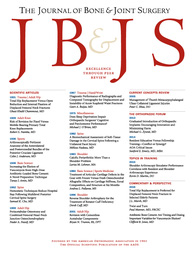
Arthroplasty
Role of erythropoietin in reducing allogeneic transfusions after joint arthroplasty
J Bone Joint Surg Am. 2003 Sep;85-A(9):1795-800240 patients undergoing arthroplasty of the hip or knee were randomized to preoperatively receive erythropoietin and autologous donation (Group 1), erythropoietin alone (Group 2), or preoperative autologous donation alone (Group 3). Patients were then evaluated postoperatively for allogeneic transfusion requirements, hemoglobin values, and complications or adverse reactions. Patients in Group 1 had the lowest allogeneic transfusion rate at 11%, compared to 28% for Group 2 and 33% for Group 3. The results highlight the effectiveness of preoperative use of erythropoietin in association with preoperative autologous donation to reduce the need for allogeneic blood transfusion associated with total joint arthroplasty.
Unlock the full article
Get unlimited access to OrthoEvidence with a free trial
Start TrialCritical appraisals of the latest, high-impact randomized controlled trials and systematic reviews in orthopaedics
Access to OrthoEvidence podcast content, including collaborations with the Journal of Bone and Joint Surgery, interviews with internationally recognized surgeons, and roundtable discussions on orthopaedic news and topics
Subscription to The Pulse, a twice-weekly evidence-based newsletter designed to help you make better clinical decisions
Exclusive access to original content articles, including in-house systematic reviews, and articles on health research methods and hot orthopaedic topics
Or continue reading this full article
Register Now

Subscribe to "The Pulse"
Evidence-Based Orthopaedics direct to your inbox.




































